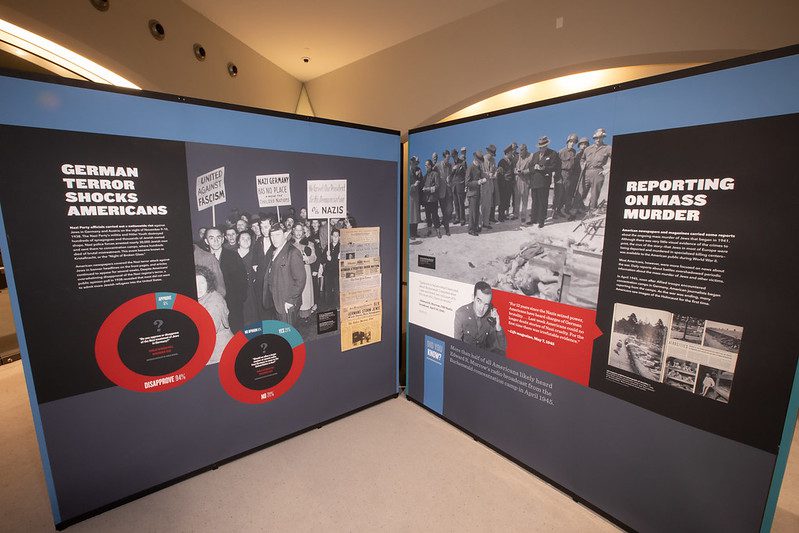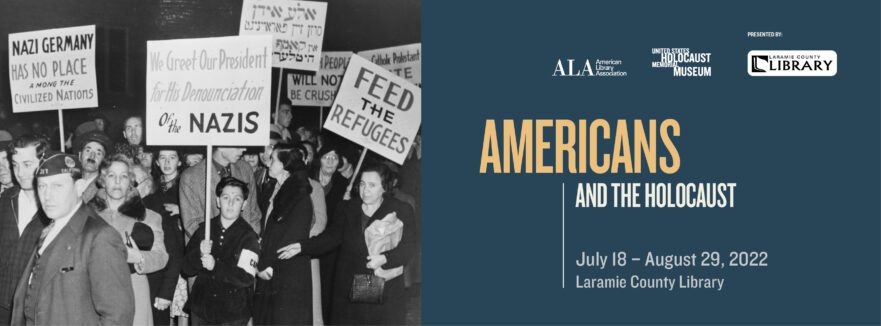On display at Laramie County Library July 18, 2022 to August 29, 2022
Laramie County Library is one of 50 U.S. libraries selected to host Americans and the Holocaust, a traveling exhibition from the U.S. Holocaust Memorial Museum that examines the motives, pressures and fears that shaped Americans’ responses to Nazism, war and genocide in Europe during the 1930s and 1940s.
Based on extensive new research of that period, Americans and the Holocaust addresses important themes in American history, exploring the many factors — including the Great Depression, isolationism, xenophobia, racism and antisemitism — that influenced decisions made by the U.S. government, the news media, organizations and individuals as they responded to Nazism. This exhibition will challenge the commonly held assumptions that Americans knew little and did nothing about the Nazi persecution and murder of Jews as the Holocaust unfolded.
Drawing on a remarkable collection of primary sources from the 1930s and ’40s, the exhibition focuses on the stories of individuals and groups of Americans who took action in response to Nazism. It will challenge visitors to consider the responsibilities and obstacles faced by individuals — from Franklin Delano Roosevelt to ordinary Americans — who made difficult choices, sought to effect change, and, in a few cases, took significant risks to help victims of Nazism even as rescue never became a government priority
Americans and the Holocaust: A Traveling Exhibition for Libraries is an educational initiative of the United States Holocaust Memorial Museum and the American Library Association.
Americans and the Holocaust exhibit was made possible by the generous support of lead sponsors Jeannie & Jonathan Lavine. Additional major funding was provided by the Bildners — Joan & Allen z”l, Elisa Spungen & Rob, Nancy & Jim; and Jane and Daniel Och. The Museum’s exhibitions are also supported by the Lester Robbins and Sheila Johnson Robbins Traveling and Special Exhibitions Fund, established in 1990.
Americans and the Holocaust Events
Beyond Heart Mountain: Japanese Americans’ Experiences During WWII
Tuesday, July 19
6–8pm
Gain insight into the multi-faceted and harrowing experiences of Japanese Americans during WWII with a presentation from Alan O’Hashi, author and producer/director of Beyond Heart Mountain, a film and a book that detail his and his family’s life and experiences in Cheyenne, WY during this time. As part of the library’s programming for Americans and the Holocaust, a traveling exhibition for libraries, Alan will detail the pervasive and insidious racism towards Japanese Americans during WWII, both in Wyoming and around the country, providing a lens with which to consider contemporary violence towards Asian Americans and the ongoing societal issue of civility.
(Adults & Teens; Cottonwood Room)
Pine Bluffs Brown Bag Book Club: Under the Blood Red Sun
Wednesday, July 20
12–1pm
We will be discussing the book, Under the Blood Red Sun by Graham Salisbury which details the story of Nisei, a teenager in Honolulu whose father and grandfather are arrested and interned as part of the United States’ wrongful imprisonment of Japanese American citizens after the attack on Pearl Harbor. The book ties into themes and concepts detailed in Americans and the Holocaust, a traveling exhibition for libraries, currently on display at Laramie County Library in Cheyenne.
After our discussion, we will explore the art of gaman, art that was created and produced by internees in detention camps across the United States. Using whatever was available to them, Japanese Americans created stunningly beautiful pieces of art that evoked the circumstances of their wrongful imprisonments.
(Grades 5–8; Pine Bluffs Main Street Park)
Pine Bluffs Friday Morning Matinee
Friday, July 22
10am–12pm
Head to the Pine Bluffs Branch Library for a showing of the 1942 classic movie, Casablanca (rated PG). This movie is a recommended film from the United States Holocaust Memorial Museum, and is part of the library’s programming for Americans and the Holocaust, a traveling exhibition for libraries, currently on display at Laramie County Library in Cheyenne. Starring Humphrey Bogart and Ingrid Bergman, the movie tells the story of a cynical American expatriate struggling to decide whether or not he should help his former lover and her fugitive husband escape French Morocco during World War II. Please take time to view information displayed about the various actors who were immigrants or refugees from the conflicts in Europe.
(Adults & Teens; Pine Bluffs Branch Library)
Teen Book Discussion: They Called Us Enemy
Wednesday, August 3
6–8pm
Join us for a discussion on the graphic novel They Called Us Enemy by George Takei, as we examine the book’s themes and consider concepts from the Americans and the Holocaust, a traveling exhibition for libraries, currently on display. We will take a look at Wyoming’s own role in interning Japanese citizens at Heart Mountain, and the impact it had on the lives of Japanese Americans. Teens who sign up will enjoy a free dinner during the event.
Sign up for this event at https://lclsonline.org/event/teen-book-discussion-they-called-us-enemy-rsvp-required/ and pick up your copy of the book from the 2nd floor Ask Here desk beginning July 20.
(Teens; Sage Room)
Seizure of Power: The Rise of the Nazi Party in Germany, 1920-1933
Thursday, August 4
6–8pm
Join us for the first program in a series of expert presentations from Dr. Adam Blackler, Ph.D. and Associate Professor of History at the University of Wyoming, all of which will provide context and historical background for the themes and concepts presented in Americans and the Holocaust, a traveling exhibition for libraries, currently on display.
The Weimar Republic (1919-1933)—Germany’s first liberal democracy—was not doomed to inevitable failure. Much to the contrary, it imparted women, men, and children with new opportunities that a diverse and eager citizenry seized enthusiastically. The same circumstances that helped usher in German democracy, however, also incited the emergence of extremist right-wing movements throughout a defeated and deeply embarrassed country. Among these was the Nazi Party (NSDAP). As one of many nascent political organizations, the NSDAP sought the revocation of the Treaty of Versailles, a return of forfeited territory, and the expulsion of all so-called “foreign enemies” beyond Germany’s borders. This presentation will explore how Adolf Hitler and the Nazi Party navigated the contours of German democracy—both legally and illegally—between 1920 and 1933. It will place particular emphasis on the Nazis’ evolution into a “catch-all party,” as well as its use of xenophobic propaganda, street violence, and political obstruction to achieve political power in January 1933.
(Adults; Cottonwood Room)
We Fought Back: Stories and Songs of Physical and Spiritual Resistance During the Shoah (Holocaust)
Tuesday, August 9
6–8pm
As it became clear by at least 1942 that the ultimate goal of the Nazi regime was the extermination of all Jews worldwide, Jews and their allies mounted many forms of physical, spiritual, and political resistance, particularly in the “ghettoes” (walled-in sections of cities the Nazis had created), extermination and work camps, and forests throughout Poland, Belarus, Ukraine, and elsewhere. Rabbi Halfon – who has studied the period extensively – will discuss just a handful of such uprisings and acts of resistance (both spiritual and personal as well as physical), and as an added bonus, he will perform songs of the “Partizaner” fighters of that time in both Yiddish and English translation. This event is part of the library’s programming for Americans and the Holocaust, a traveling exhibition for libraries, currently on display at Laramie County Library in Cheyenne.
(Adults; Cottonwood Room)
Nazi Germany and the Racial State: ‘Cumulative Radicalization’ and the Twisted Road to Auschwitz
Thursday, August 11
6–8pm
Join us for the second program in a series of expert presentations from Dr. Adam Blackler, Ph.D. and Associate Professor of History at the University of Wyoming, all of which will provide context and historical background for the themes and concepts presented in Americans and the Holocaust, a traveling exhibition for libraries, currently on display.
Racism and antisemitism did not propel Adolf Hitler to political power in January 1933. Much to the contrary, many women and men who supported the Nazis did so because of their promises of “Freedom, Work, and Bread.” And yet, after only a few weeks as chancellor, Hitler moved to craft Germany into a dictatorial and racial state. This lecture will explore this violent period of history by examining the decrees, programs, and propaganda that German authorities fashioned between 1933 and 1935. It will consider these prejudicial initiatives in an international and comparative context, specifically with Great Britain, South Africa, and the United States. In addition, it will pose two questions for us to ponder collectively: 1) how was Hitler able to advance racist policies in Germany without a broad or popular mandate from the German people and 2) why did so many citizens seemingly accept these pronouncements voluntarily?
(Adults; Cottonwood Room)
Jewish Genealogy
Tuesday, August 16
7–8:30pm
As part of the library’s programming for Americans and the Holocaust, a traveling exhibition for libraries, this class will give you a start in researching your Jewish ancestors in records found in the United States, Europe, and Israel. We will cover resources such as Ancestry.com, FamilySearch.org, and JewishGen.org. We will also explore information located in libraries, archives, and vital record offices, including the United State Holocaust Memorial Museum and Yad Vashem.
(Adults; Sunflower Room)
The True Story of an American Couple’s Rescue Mission in Nazi Germany
Thursday, August 18
6–8pm
Steve Pressman has brought the incredible true story of Gilbert and Eleanor Kraus to the small screen in his Emmy-nominated HBO documentary 50 Children: The Rescue Mission of Mr. and Mrs. Kraus and to bookshelves with his acclaimed book 50 Children: One Ordinary American Couple’s Extraordinary Rescue Mission into the Heart of Nazi Germany.
As part of the library’s programming for Americans and the Holocaust, a traveling exhibition for libraries, Steve Pressman will present the heroics of this ordinary American couple who travelled to Nazi-controlled Vienna and Berlin in 1939 to save the lives of fifty Jewish children. With time for Q&A afterwards, the evening promises to give one-of-a-kind insight into this amazing couple’s efforts to fight against Nazism when they felt their country was not doing enough.
(Adults; Cottonwood Room)
‘Twilight of the Gods’: Defeat, Memory, and Legacy of World War II and the Holocaust
Thursday, August 25
6–8pm
Join us for the final program in a series of expert presentations from Dr. Adam Blackler, Ph.D. and Associate Professor of History at the University of Wyoming, all of which will provide context and historical background for the themes and concepts presented in Americans and the Holocaust, a traveling exhibition for libraries, currently on display.
In 1945, Europe offered a prospect of total misery and anguish. Hitler’s war, unlike previous conflicts, was a near-universal experience for everyone caught in its wake—soldiers and citizens, politicians and peasants, capitalists and communists, women, men, and children. The Nazi revolution had promised a new awakening in Germany. Instead, it brought destruction and death far beyond the borders of Central Europe. An estimated 55 million people died worldwide in World War II. Among them were more than 5 million German soldiers, 27 million Soviet citizens, millions of Poles, and close to 6 million Jews. The list could go on, and the world continues to feel the effects of hatreds sown for the Nazi goals of racial purification and territorial expansion. This lecture will explore how Europeans emerged from the most destructive war in human history on both sides of the so-called Iron Curtain. It will place special emphasis on political and social transformations in Europe between 1945 and 1948, as well as the emergence and proliferation of Holocaust denialism in the world up to the present day.
(Adults; Cottonwood Room)

